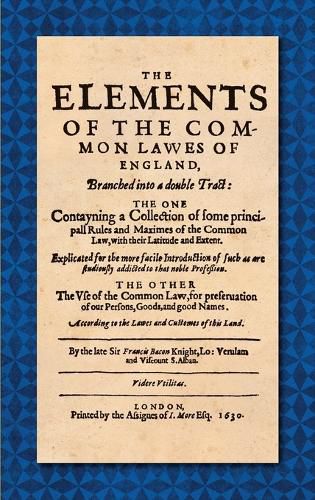Readings Newsletter
Become a Readings Member to make your shopping experience even easier.
Sign in or sign up for free!
You’re not far away from qualifying for FREE standard shipping within Australia
You’ve qualified for FREE standard shipping within Australia
The cart is loading…






This title is printed to order. This book may have been self-published. If so, we cannot guarantee the quality of the content. In the main most books will have gone through the editing process however some may not. We therefore suggest that you be aware of this before ordering this book. If in doubt check either the author or publisher’s details as we are unable to accept any returns unless they are faulty. Please contact us if you have any questions.
The Elements of the Common Laws of England is the general title for a work that is comprised of two different treatises: A Collection of Some Principall Rules and Maximes of the Common Lawes of England and The Use of the Law, Provided for the Preservation of Our Persons, Goods and Good Names. The first contains a set of twenty-five maxims, or regulae. One of the earliest, if not first, collections of maxims on English law, it is remarkable for its stylistic vigor, intellectual rigor, meticulousness and clarity. The second treatise is a review of the history and practical application of criminal law, estate law, personal property law and the law of slander (i.e. the preservation of our good names from shame and infamy ). The Use of the Law is probably not in fact by Bacon; it was first printed anonymously as Part II of The Lawyers Light (1629) by Sir John Doddridge. Among America’s Founding Fathers, Jefferson held Bacon in high esteem. In a 1789 letter to John Trumbull, he said he considered Bacon, Locke and Newton to be the three greatest men that have ever lived, without any exception. xix, 104, vii, 84 pp.
$9.00 standard shipping within Australia
FREE standard shipping within Australia for orders over $100.00
Express & International shipping calculated at checkout
This title is printed to order. This book may have been self-published. If so, we cannot guarantee the quality of the content. In the main most books will have gone through the editing process however some may not. We therefore suggest that you be aware of this before ordering this book. If in doubt check either the author or publisher’s details as we are unable to accept any returns unless they are faulty. Please contact us if you have any questions.
The Elements of the Common Laws of England is the general title for a work that is comprised of two different treatises: A Collection of Some Principall Rules and Maximes of the Common Lawes of England and The Use of the Law, Provided for the Preservation of Our Persons, Goods and Good Names. The first contains a set of twenty-five maxims, or regulae. One of the earliest, if not first, collections of maxims on English law, it is remarkable for its stylistic vigor, intellectual rigor, meticulousness and clarity. The second treatise is a review of the history and practical application of criminal law, estate law, personal property law and the law of slander (i.e. the preservation of our good names from shame and infamy ). The Use of the Law is probably not in fact by Bacon; it was first printed anonymously as Part II of The Lawyers Light (1629) by Sir John Doddridge. Among America’s Founding Fathers, Jefferson held Bacon in high esteem. In a 1789 letter to John Trumbull, he said he considered Bacon, Locke and Newton to be the three greatest men that have ever lived, without any exception. xix, 104, vii, 84 pp.